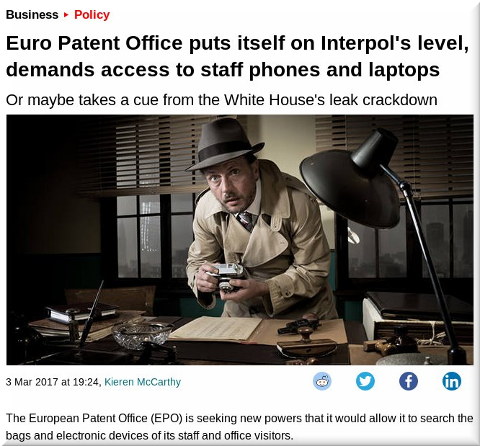

Sadly for them, anyone who brings a phone to work already has a camera and data can be encrypted
The Register, which has readership of millions of people per day (not just in the UK), continues to do a fine series on EPO scandals. It is in no way coordinated by Techrights, but it is ever more apparent that they rely on us for information, documents, etc. so keep these coming.
"There is plenty of room here for comparisons to the Trump administration, which faces a growing number of leaks and unauthorised disclosures that it is unable to prevent/respond to."The latest article, as is common, got published just before the weekend entered, after we had published some new material (don't miss last night's article, "Dutch Foreign Minister Reads the Riot Act to EPO Vice-President Willy/Guillaume Minnoye").
The latest in the series from The Register looks into the privacy angle (sheer privacy abuses) by Team Battistelli and those cronies like Minnoye who have grown increasingly worried about leaks (they actually speak about it). There is plenty of room here for comparisons to the Trump administration, which faces a growing number of leaks and unauthorised disclosures that it is unable to prevent/respond to. To quote Kieren McCarthy:
The European Patent Office (EPO) is seeking new powers that it would allow it to search the bags and electronic devices of its staff and office visitors.
Under proposed rule changes put forward by the organization's administration, security staff would be entitled to seize and search bags, phones and laptops at any of the EPO's locations. The changes would also prohibit the creation or dissemination of posters and flyers without explicit management permission.
To justify the extraordinary measures, the organization's security head argued that the EPO's protocols were not up to similar levels as "similar" international organizations such as the United Nations and Interpol.
It didn't take long for EPO staff to slam the comparison between an office that reviews patent applications and one that deals with issues of national and international security. As far as anyone is aware none of Microsoft's patents have ever come in a folder marked "Top Secret".
In a memo sent to workers at the EPO's Hague office, the staff committee noted that "in the 40 years’ history of the Office, there has not been any real threat. One wonders if new and very intrusive rules are necessary in the first place."
The European Patent Organisation is set up in a way not dissimilar to the EU itself. It exists as a result of a treaty entered into by various separate sovereign nations, many (but not all) who have also signed up to the various treaties that underpin the EU.
And, like the EU and the European Commission, this makes the EPO effectively un-governable. Whilst it is in theory accountable to its member nations, it would take all of them to agree on a course of action if it's direction were to be forcibly changed, like sacking the head of the office.
The discussion surrounding BREXIT is fascinating. On the one hand there's a bunch of EU types promising a hard time for Britain, no trade deal, big divorce settlement, etc. On the either hand there's the German government who seemingly don't agree (they sell a lot of cars here), Sweden and Poland talking openly about having to do a deal with the UK, etc.
One way or other it's going to define who in Europe really pulls the strings; sovereign nations or the European Union / Commission? The treaties say that the nations have devolved many powers to the EU, including the power to arrange trade deals, but it's the member nations who have to decide on whether their (collective?) best interests are still being served by the EU. BREXIT is perhaps the first issue big enough to force all the member nations to truly, seriously consider that question. Here in the UK we're kinda dependent on them doing so.
Alas, the situation in the European Patent Office is so low down the list of priorities for the member nations of the EPO that it is unlikely it will be sorted out. This situation will continue to fester until the situation resolves itself "naturally", or until the Office has become so dysfunctional that politicians in the member nations are being badgered about problems with patents by companies in their own country.
Like many international treaties of this sort, there's very often little thought put into them to define what should happen when things go wrong, how indeed performance of the arrangements should be measured so as to know whether things are going wrong or not, etc. The treaties behind the Eurozone are classics of the genre, with nothing in them to define what happens when a member nation goes bust. Hence the improvised support for Greece, and soon Italy. Such ommissions in the Eurozone treaties were part of the reason why the British government ultimately deciding to not join in.
This always happens because when all the negotiators are sat in that one room talking about setting up the treaty, it's impolite to ask the awkward questions about "problems arising" which might be taken as an insult by others in the room. Appalling really.
In a few months time (when this particular news has blown over) we'll suddenly get some new positive stories about how much good work EPO is doing (I always thought EPO was illegal while cycling) and it'll probably soon followed by a bill.
Because this kind of quality obviously comes at a cost. These guys don't work for free you know.
And then a few months later you'll learn that it has all come to pass. Carefully kept outside the media.